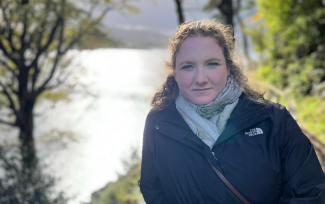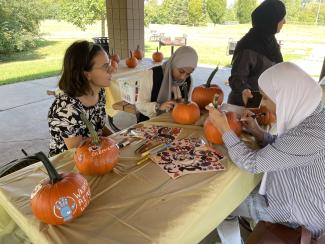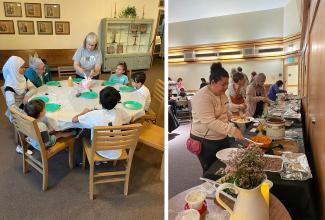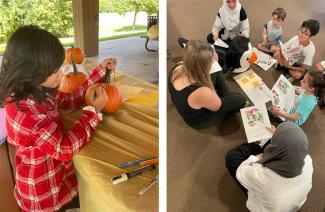Our More Life, Less Stuff campaign, a partnership of the City of Ann Arbor and the Ecology Center, is sharing stories about building community, strengthening our connections, and celebrating life, all while using less stuff.
The More Life, Less Stuff campaign is about rethinking our relationship with stuff and reimagining ways that our stuff, once no longer needed, can serve our community. As our lives and needs change, we don't have to add items in good condition to landfills. We can share those items with our neighbors and use them to serve and support our community members, especially our newest members. We spoke with volunteers from two community organizations, the Washtenaw Refugee Welcome (WRW) and the House By the Side of the Road, to learn about the folks who need help, how to access help, and what we can do to support these organizations that perform the vital services of welcoming our neighbors and ensuring folks have what they need.
The Washtenaw Refugee Welcome is Empowering Neighbors to Help Neighbors.

Washtenaw Refugee Welcome works exclusively with refugees and their families. In Washtenaw County, refugees work with Jewish Family Services, a resettlement agency licensed by the government to help refugees find a place to live and get established. After three months, much of that government financial support goes away, but refugees often still need help. That is where Washtenaw Refugee Welcome (WRW) comes in.
Since 2016, WRW, an all-volunteer non-profit, has supported refugees in our community. According to Emmeline, WRW volunteers "create social opportunities, facilitate getting household items and donations to refugees, act as a familiar face and a helping hand in the community." They do everything from hosting events for pumpkin painting and a Thanksgiving potluck to answering questions about mysterious mail and parental concerns about a child's school.

One of the main things they do is connect refugees with other community organizations that provide support, like Food Gatherers, House By the Side of the Road, and the Hope Clinic food pantry.
When asked what she is most proud of, Emmeline Weinert responded, "I'm proud of the families who continue to come to our events. Some families resettled years ago and are still at our Thanksgiving Potluck because we were their initial family and support system when they came to the area. And so often, those are our best advocates out in the community. They meet a neighbor who's a refugee or something like that, and then they bring them in." Washtenaw Refugee Welcome makes a difference in the lives of neighbors who, as refugees, by definition, have struggled to get to a place where they and their families can be safe.

What can I do to help?
There are many ways that we, as a community, can support the Washtenaw Refugee Welcome. The first is to donate money. Over 60 % of their budget last year came from individual donations. 86% of that budget went directly to supporting refugee families through programming, financial, and other support.
We can also volunteer. Washtenaw Refugee Welcome is always looking for folks to help. When asked about volunteers, Emmeline encouraged folks to "Sign up to do the craft. Sign up to do the snack at a monthly meetup. Sign up to come to one of our picnics and maybe offer to drive a refugee family." If you are interested in volunteer opportunities, you can find more information here: https://www.washtenawrefugeewelcome.org/volunteer
In the spirit of More Life, Less Stuff, we can donate goods in good condition.
I think that's the beauty of when something isn't serving you, we don't hold onto it… we can give it to someone who can use it. Let's let our stuff serve the people we care about and want to care for. – Emmeline Weinert
Washtenaw Refugee Welcome always looks for small appliances such as countertop microwaves, kettles, pressure cookers, and vacuum cleaners. They also frequently need good-quality dishes, pots, pans, and household items. However, some items, such as diapers, soap, feminine pads, and laundry detergent, are not appropriate to reuse. For more information on those items, check out their Amazon wishlist.
Emmeline also explained that they are looking for old-fashioned, reel-to-reel push lawnmowers (not electric, not gas) for larger families renting houses requiring lawn care. When they receive these donations, they immediately take them to the families that need them.

As previously stated, one of the main goals of Washtenaw Refugee Welcome is to connect refugees with trusted community organizations and services where they can get help. One such organization is House by the Side of the Road.
The House By the Side of the Road Has Been Giving Back to the Community Since 1970.
House By the Side of the Road is another all-volunteer organization that takes gently used goods and distributes them to the community free of charge. Essentially, they operate a thrift shop where folks in the community who need help can "shop" for free. They have a variety of goods, including bedding, clothing (especially winter gear), and shoes for kids and adults. If you need help and live in Washtenaw County, House By the Side of the Road only requires that you bring an ID or other proof or Washtenaw County residency. Clients do not need to make an appointment or have a referral to stop by and get needed items. They are open for clients Monday through Friday from 10 am to 2 pm. Come by and get stuff.
They also accept donations of goods they stock for folks who come in and cash, which is used to support the organization's operations.
We visited House By the Side of the Road to learn more about their program and talk with their volunteers and manager – watch their story here:
Washtenaw Refugee Welcome and House By the Side of the Road help us show that we care by sharing resources like household goods and clothing and giving money and time when we can. Amazing people throughout our community are working together to ensure our neighbors know they are valued and important and that we, as a community, care about each other. We can come together as a community to welcome our newest members and help provide access to the resources they need to build a life here and thrive.
To become refugees, they must first flee their homes and cross an international border. Then, they apply to the United Nations High Commissioner for Refugees (UNHCR) for refugee status. UNHCR evaluates whether each person qualifies as a refugee. However, qualifying for refugee status doesn't automatically mean they get to move to another country. Each country only allows so many refugees to resettle. The UNHCR prioritizes the folks who are most at risk in their home country and the country they fled to. When selected, the UN refers people to a host country that does its own, often intensive, screening to decide whether or not to accept them. It is a long and arduous process that can take years.
If accepted in the US, they get three months of support through a resettlement agency that works with the State Department. The resettlement agency in Washtenaw County is the Jewish Family Services. This agency is licensed and partially funded by the government to help refugees find a place to live and get established. After three months, much of the government's financial support for refugees has disappeared, but refugees often still need help. That is where Washtenaw Refugee Welcome (WRW) comes in.
